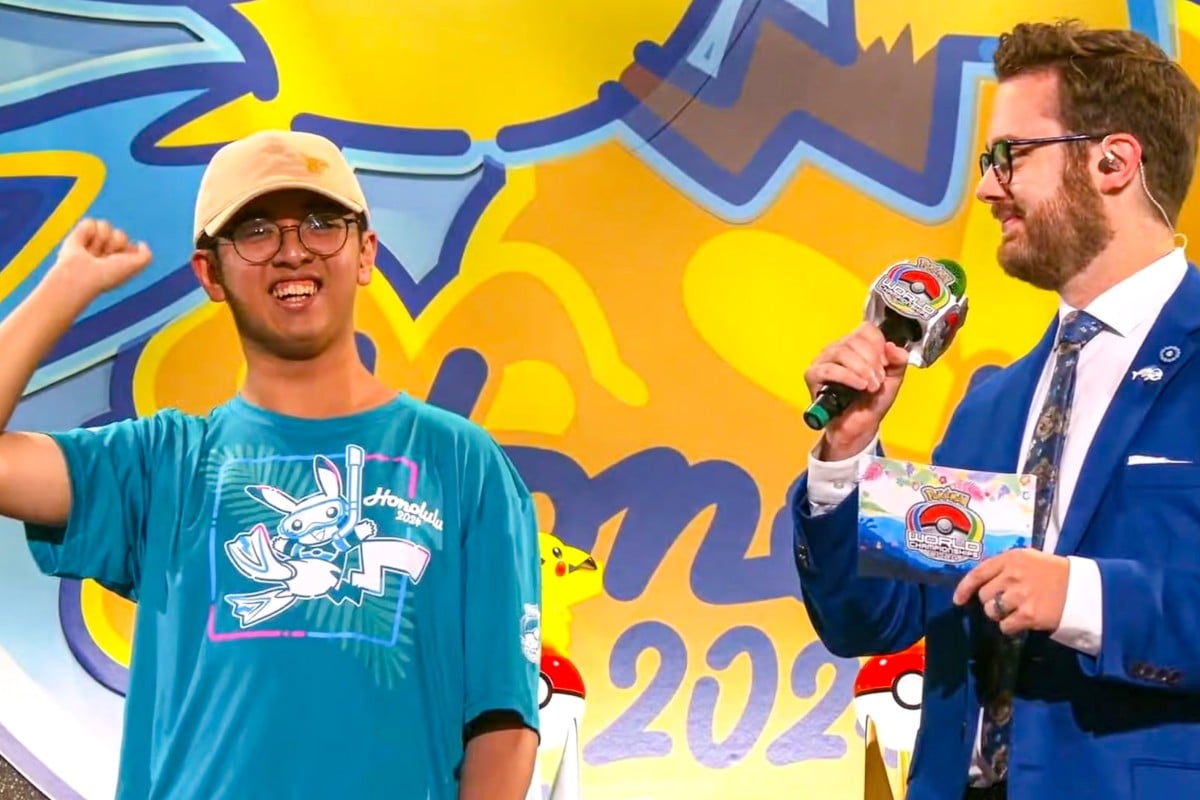 Hong Kong teenager Cheng Yip-kai has been crowned world champion when it comes to Pokemon. Photo: Pokémon Company
Hong Kong teenager Cheng Yip-kai has been crowned world champion when it comes to Pokemon. Photo: Pokémon Company
Spokespersons from Hong Kong’s esports sector have urged authorities to inject more capital into the industry, saying they believe it will enhance the city’s economy and technological development as local players have shown their potential at recent events.
The calls for more resources followed 16-year-old Cheng Yip-kai becoming the first Hongkonger to win the Pokemon World Championships, held this year in Honolulu, Hawaii.
Eric Yeung Chuen-sing, founding president of the Esports Association of Hong Kong, said Cheng’s victory on Sunday, as well as achievements such as a Hong Kong team winning a silver medal at the Asian Games in Hangzhou last September, were a breakthrough and showcased players’ potential.
“Despite a lack of resources, Hong Kong has a lot of quality players … Esports and players in Hong Kong mainly rely on their own to train and use their own resources to develop,” he said on Tuesday.
“Esports is emerging and we have a lot of chances to get good results. It is worthwhile for the government to consider allocating resources.”
He added that esports could also help in the development of innovation and technology, which the government had laid a focus on in recent years.
The government injected HK$100 million into esports in 2018 to renovate part of the Arcade shopping centre at the Cyberport tech hub into a competition venue and to support organising local and regional competitions, mega events, training and promotion.
Video game performers will go on strike over artificial intelligence concerns
Yeung, who also sits on the board of directors of Hong Kong Cyberport Management Company, said the funding was useful as many esports start-ups emerged in the following years and more than 100 competitions were organised annually at its peak.
But the Covid-19 pandemic, which started in 2020, was a blow to the sector with fewer than 10 competitions organised annually and more than 90 per cent of the companies shutting down.
According to Yeung’s knowledge, the funding was all used up five years after it was launched.
“The experience in 2018 and 2019 proves that the government’s support can catalyse esports development but the money came at the wrong time,” Yeung said.
He said he hoped the government would consider allocating another round of resources in October’s policy address, such as mobilising the private sector to support esports events through matching funds.
“The government can consider using esports as a new economic impetus,” he said.
Sam Cheung Lok-hang, who managed the team of Hong Kong representatives at the Pokemon World Championships, also expressed hope that local players would receive more funding.
He said some Hong Kong players qualified for the Pokemon World Championships in London two years ago but gave up their spots as they did not want to spend money to take part.
Cheung, who felt it was a shame, managed to raise funds to support a team of five to the championships in Japan last year.
Among those who helped finance their trip was renowned liver expert Dr Lai Ching-lung, emeritus professor and honorary clinical professor at the University of Hong Kong, and a Pokemon Go enthusiast.
A Pokemon-themed merchandise brand in Hong Kong sponsored Cheng’s apparel and accessories this year, while event organisers covered his plane ticket and accommodation in Hawaii, a privilege for the top player in the Asia-Pacific region.
Cheung said that although players, also known as “trainers”, were not full-time professionals, they needed some form of support to fund trips to overseas competition as they were representing Hong Kong on the global stage.
“They should not be deterred from taking part just because of a lack of funding,” he said.
Cheung added that most players in Hong Kong were working professionals in their twenties and thirties and would not give up their careers to be full-time gamers.
There was also no successful precedent elsewhere in the world, Cheung said.
“However, if there is one person who has potential, it is Cheng,” he said.
